人教新目标版英语九年级全Unit 1 How can we become good learners?Section A 3a-3b课件 (共40张PPT无素材)
文档属性
| 名称 | 人教新目标版英语九年级全Unit 1 How can we become good learners?Section A 3a-3b课件 (共40张PPT无素材) | 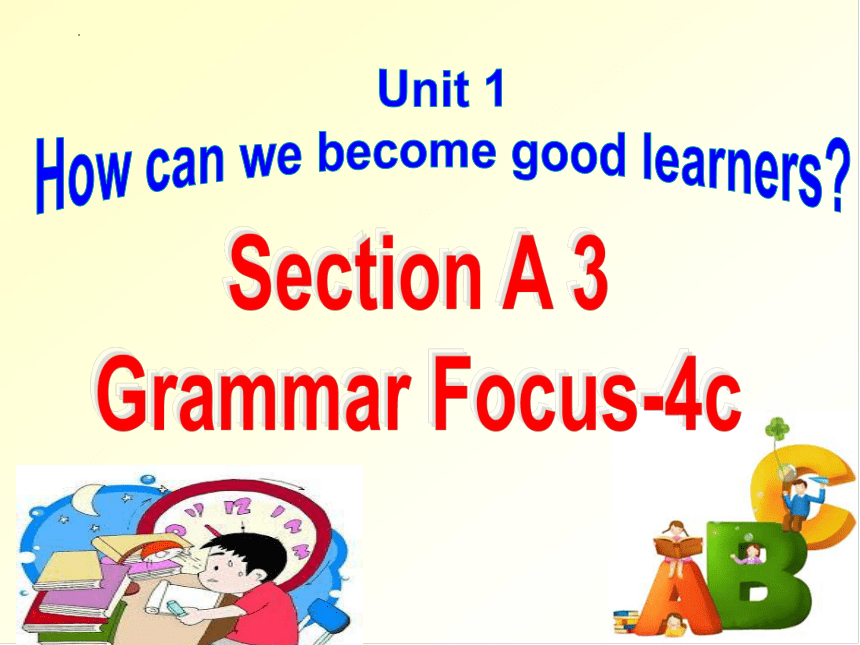 | |
| 格式 | zip | ||
| 文件大小 | 895.5KB | ||
| 资源类型 | 教案 | ||
| 版本资源 | 人教新目标(Go for it)版 | ||
| 科目 | 英语 | ||
| 更新时间 | 2022-08-14 22:44:31 | ||
图片预览

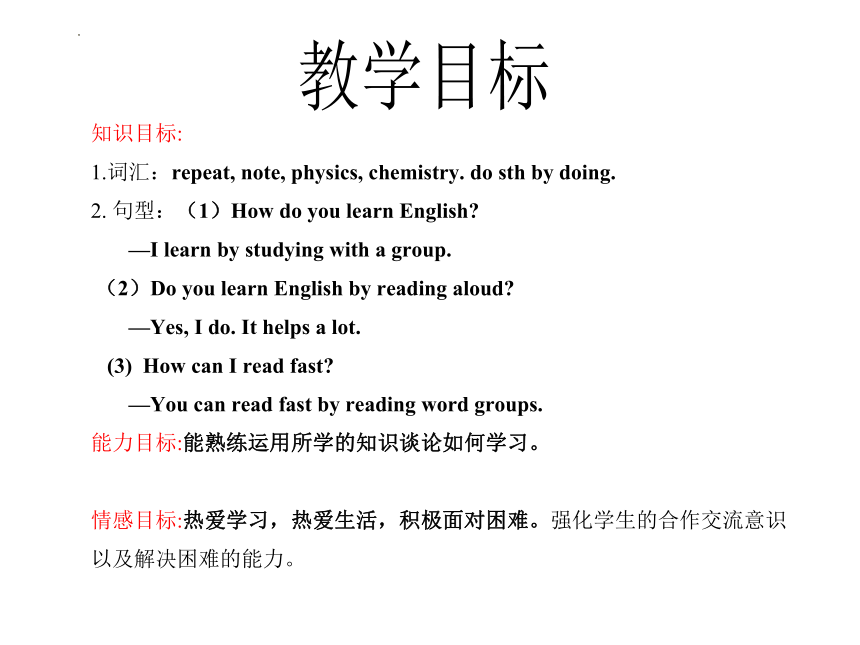

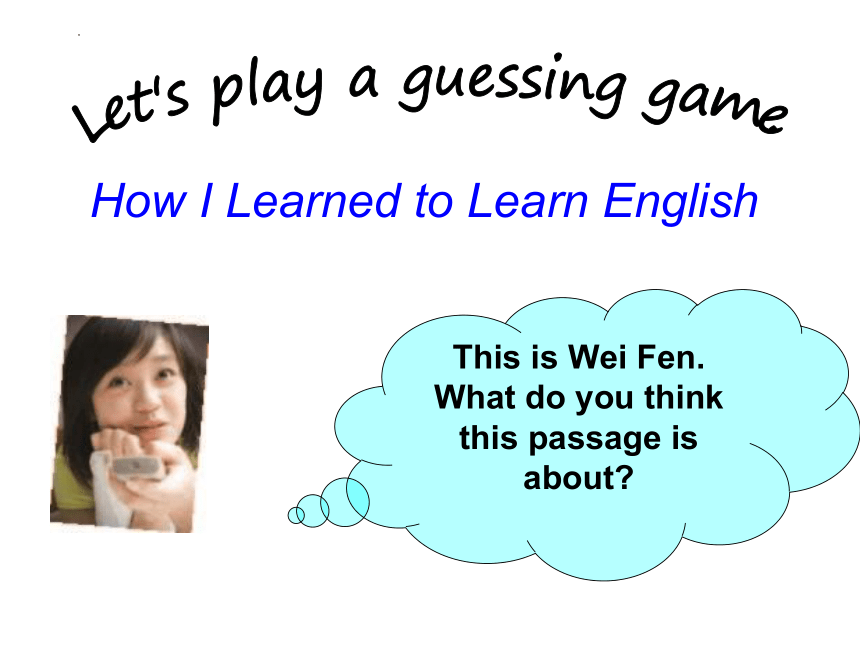

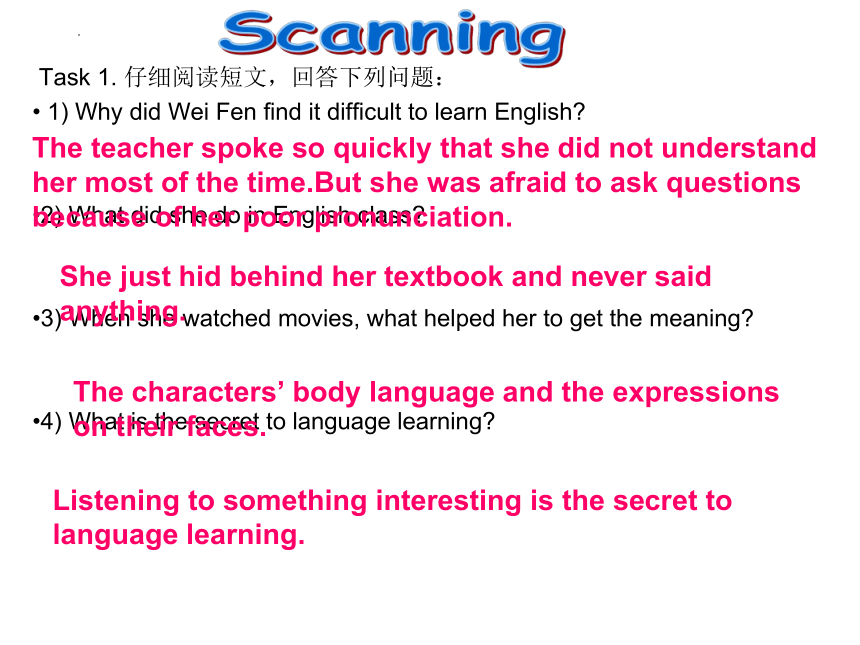
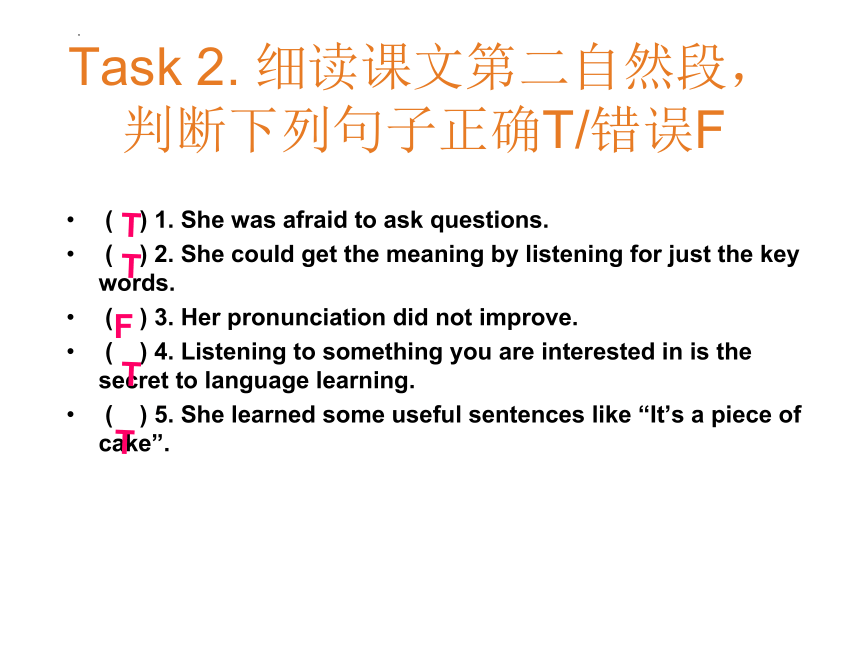
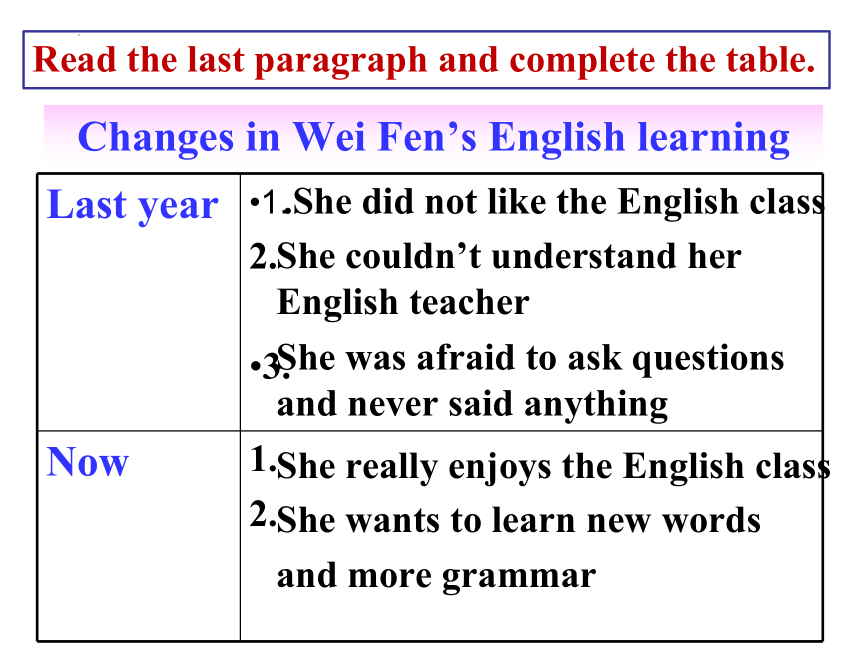
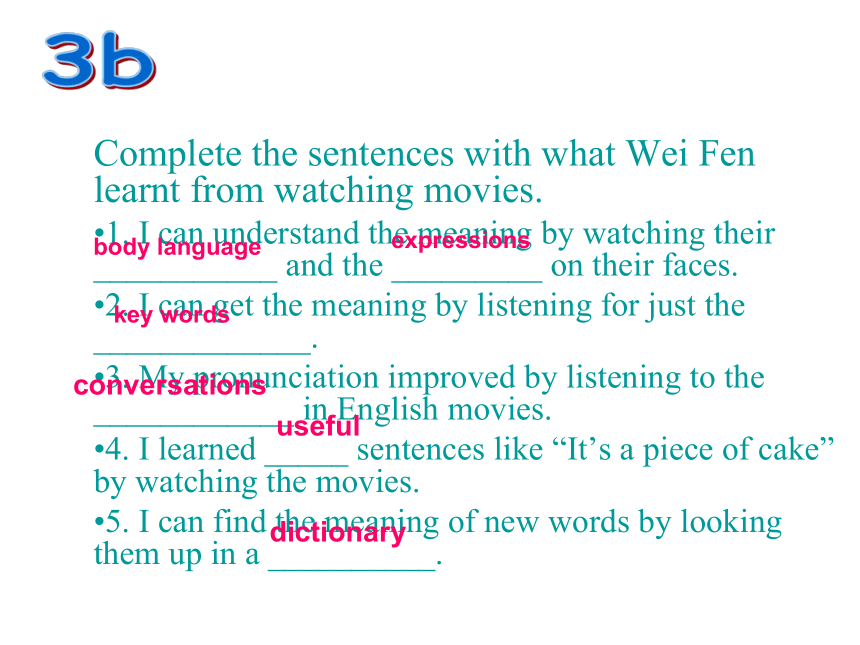
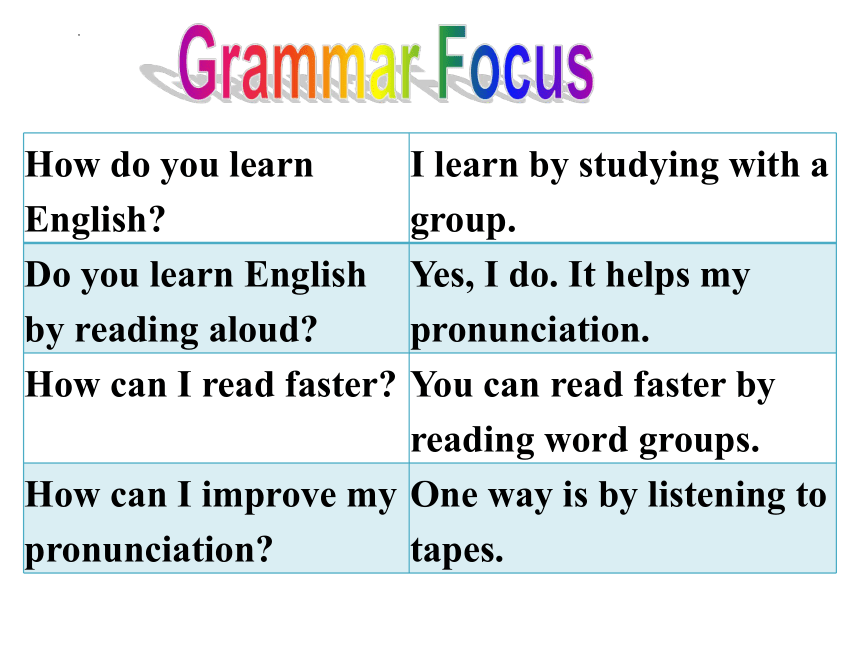
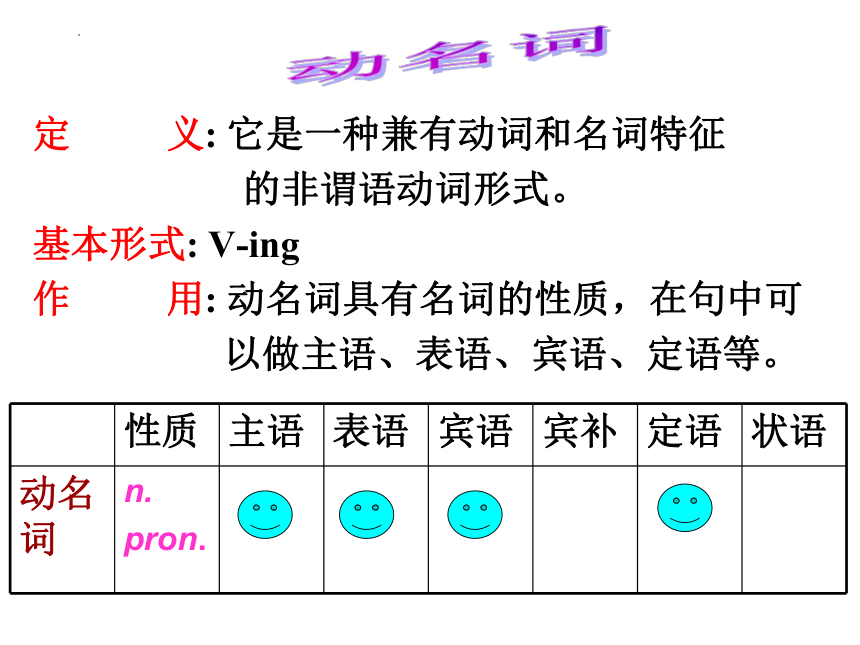
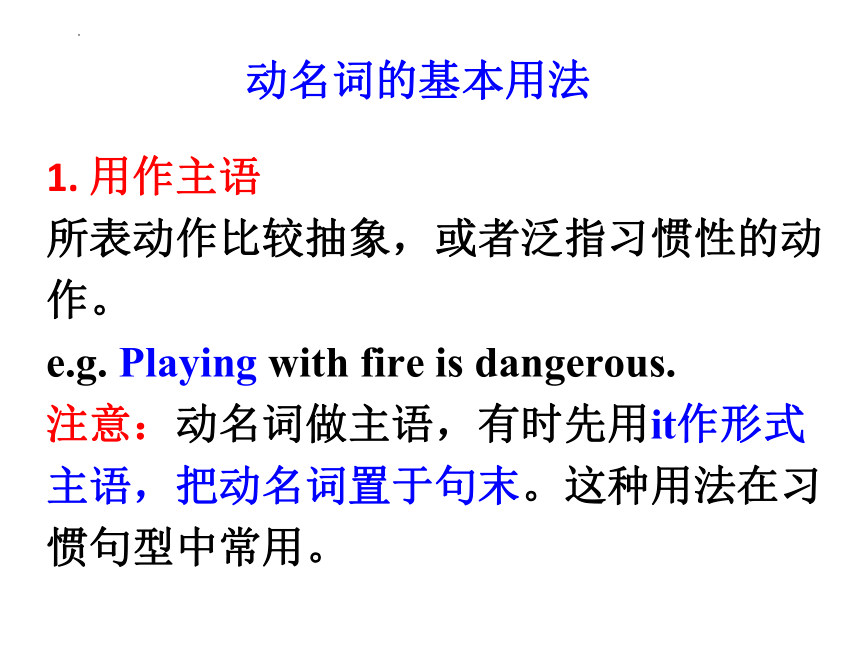
文档简介
(共40张PPT)
Unit 1
How can we become good learners
Section A 3
Grammar Focus-4c
知识目标:
1.词汇:repeat, note, physics, chemistry. do sth by doing.
2. 句型:(1)How do you learn English
—I learn by studying with a group.
(2)Do you learn English by reading aloud
—Yes, I do. It helps a lot.
(3) How can I read fast
—You can read fast by reading word groups.
能力目标:能熟练运用所学的知识谈论如何学习。
情感目标:热爱学习,热爱生活,积极面对困难。强化学生的合作交流意识以及解决困难的能力。
教学目标
Free talk
Talk about the ways you learn other
subjects. You can use the following phrases and sentences.
How do you learn Chinese/ math /physics/chemistry
Do you learn history and geography by___________
How I Learned to Learn English
This is Wei Fen. What do you think this passage is about
Let's play a guessing game.
1. Did Wei Fen like English last year
2. How about now
Skimming
No, she didn’t.
Now she really enjoys English class.
Reading strategy (阅读策略):
Read fast to get key words (关键词).
Don’t worry about the new words.
Task 1. 仔细阅读短文,回答下列问题:
1) Why did Wei Fen find it difficult to learn English
2) What did she do in English class
3) When she watched movies, what helped her to get the meaning
4) What is the secret to language learning
Scanning
The teacher spoke so quickly that she did not understand her most of the time.But she was afraid to ask questions because of her poor pronunciation.
She just hid behind her textbook and never said anything.
The characters’ body language and the expressions on their faces.
Listening to something interesting is the secret to language learning.
Task 2. 细读课文第二自然段,判断下列句子正确T/错误F
( ) 1. She was afraid to ask questions.
( ) 2. She could get the meaning by listening for just the key words.
( ) 3. Her pronunciation did not improve.
( ) 4. Listening to something you are interested in is the secret to language learning.
( ) 5. She learned some useful sentences like “It’s a piece of cake”.
T
T
T
T
F
Read the last paragraph and complete the table.
Changes in Wei Fen’s English learning
Last year 1.
2.
3.
Now 1.
2.
.She did not like the English class
She couldn’t understand her
English teacher
She was afraid to ask questions
and never said anything
She really enjoys the English class
She wants to learn new words
and more grammar
Complete the sentences with what Wei Fen learnt from watching movies.
1. I can understand the meaning by watching their ___________ and the _________ on their faces.
2. I can get the meaning by listening for just the _____________.
3. My pronunciation improved by listening to the ____________ in English movies.
4. I learned _____ sentences like “It’s a piece of cake” by watching the movies.
5. I can find the meaning of new words by looking them up in a __________.
3b
body language
expressions
key words
conversations
useful
dictionary
How do you learn English I learn by studying with a group.
Do you learn English by reading aloud Yes, I do. It helps my pronunciation.
How can I read faster You can read faster by reading word groups.
How can I improve my pronunciation One way is by listening to tapes.
Grammar Focus
定 义: 它是一种兼有动词和名词特征
的非谓语动词形式。
基本形式: V-ing
作 用: 动名词具有名词的性质,在句中可
以做主语、表语、宾语、定语等。
性质 主语 表语 宾语 宾补 定语 状语
动名词 n. pron.
动名词
动名词的基本用法
1. 用作主语
所表动作比较抽象,或者泛指习惯性的动作。
e.g. Playing with fire is dangerous.
注意:动名词做主语,有时先用it作形式主语,把动名词置于句末。这种用法在习惯句型中常用。
1) It is no use/ good / useless + doing…
2) It is a waste of time + doing …
3) It is fun + doing …
在以上结构中常用动名词作主语。
e.g. It’s no use crying over spilt milk.
(覆水难收)
It is fun playing with children.
和孩子们一起玩真好。
2. 用作宾语
1) 作动词的宾语
常见的此类动词有:practise, enjoy, finish, give up, cannot help, keep, keep on, mind, miss, put off, depend on, think about, succeed in, worry about, be used to, get used to, look forward to, pay attention to, 等。
e.g. How do you practice speaking
I have to finish reading a book and give
a report.
2) 作介词的宾语
1. I learn English by doing grammar exercises.
2. Shall we have a rest or get down to doing our work
3. He was late again because of getting up late.
4. Lock the doors and windows before going out.
5. What/How about the two of us playing games?
3) 既可接动名词又可接不定式的常用动词有:remember, forget, regret, mean, try等,但表达的意义不同。
e.g. I remember seeing her at the hotel.
我记得在宾馆见过她。(动作发生了)
I will remember to see her at the hotel.
我记着要去宾馆见她。(动作尚未发生)
1. remember/forget/ regret
to do 动作尚未发生
doing 动作已经发生
2. try
to do 设法、努力去做,尽力
doing 试试去做(看有何结果)
3. mean
to do 打算做(主语一般是人)
doing 意味着(主语一般是物)
4. regret
to do 对将要做的事抱歉
doing 对已经发生的事感到后悔
5. stop
to do 停下去做另外一件事
doing 停止做手头的事情
3.作表语
动名词作表语时句子主语常是表示无生命的事物的名词或what引导的名词性从句。表语动名词与主语通常是对等的关系,表示主语的内容,主语、表语可互换位置。
e.g. Your task is cleaning the windows.
你的任务就是擦窗户。
(Cleaning the windows is your task.)
What I hate most is being laughed at. 我最痛恨的就是被别人嘲笑。
(Being laughed at is what I hate most.)
动名词有时态和语态的变化。
动名词的时态和语态的基本形式:(以write为例)
时态 语态 一般时 完成时
主动语态 writing having written
被动语态 being written having been written
注意:动名词的否定形式是:not writing
动名词的复合结构:
动名词的逻辑主语+动名词=动名词的复合结构
Would you mind _____(我开窗户吗)
Would you mind my / me opening the window
my/ me 称为动名词的逻辑主语。
I can’t understand Jack /Jack’s leaving his wife.
I can’t understand his/him leaving his wife.
Jack’s/ His leaving his wife is unbelievable.
4a Answer the questions. Then
match the questions and answers.
1. How do you practice speaking
2. How do you learn new words
3. How do you improve your writing
4. How do you practice listening
5. How do you improve your
pronunciation
6. How do you learn grammar
1. How do you practice speaking
2. How do you learn new words
3. How do you improve your writing
4. How do you practice listening
5. How do you improve your pronunciation
6. How do you learn grammar
c
e
f
a
b
d
a. By watching English programs.
b. By listening to a tape and repeating out loud.
c. By having conversations with friends.
d. By taking notes, doing exercises and reading a lot.
e. By making word cards.
f. By writing e-mails to my pen pals.
match physics chemistry
Chinese history geography
4b Complete these statements. Use
information that is true for you.
e.g. I usually practice my English by taking notes / reading books and newspapers / speaking English with my classmates / memorizing sentence patterns.
a. I usually practice my math by______.
b. I usually practice my physics by_______. c. I usually practice my chemistry by____.
d. I usually practice my Chinese by _____.
e. I usually practice my history and
geography by ________.
4c Check (√) what you do to learn
English. Then interview your partner.
A: Do you learn English by doing grammar exercises
B: Yes, I do.
A: How often do you do them
B:…
I learn English by… My partner learns English by…
yes no how often yes no how often
doing grammar exercises.
taking notes in English.
reading English books/magazines.
keeping a diary in English.
using an English dictionary.
…
根据汉语提示用正确形式填空。
1. Do you have any _________ (单词卡)
2. Please read _____ (大声地), I can’t
hear you.
3. Your ____________ (发音) sounds
good.
4. English ________ (语法) is very
important.
word cards
aloud
pronunciation
grammar
Exercises
—______ you ever ______ (ask) your
teachers questions
—No, never.
2. —We’re too tired. What about _______
(have) a rest
—That’s a good idea.
3. I often study by _________ (work) with
a group in class.
用所给单词的适当形式填空。
Have
asked
having
working
4. -- How do you learn Chinese
-- I learned by _________ a lot of books.
5. She earns her life by ______ (sell) newspaper.
6. -- ___________ improve your writing
-- I can improve it by keeping diaries.
reading
selling
How can you
She learns English _________________
__________________.
根据所给图示用适当的词汇完成句子。
English movies
by watching
2. She learns English ______________
____________.
by reading the
textbook
3. They learn English _____________
_________________.
by asking the
teacher for help
4. She learns English ____________
_____________.
music
by listening to
English songs
1. She can’t help ________ (cry) after _________ (hear) the bad news.
2. Do you feel like _______ (have) a break
活学活用
hearing
having
crying
选择题:
1. My watch needs ________, but I have no time to go to town to have it _______.
A. to repair; repaired
B. to be repaired; repairing
C. repairing; repaired
D. being repaired; repaired
活学活用
2. You should apologize to your sister for _____ her the truth.
A. telling B. not telling
C. telling not D. not tell
3. ---The light in the office is still on.
---Oh, I forgot ___________ it off.
A. turning B. turn
C. to turn D. having turned
4. Hearing the bad news, the mother couldn’t help ________.
A. to cry B. crying C. cry D. cries
5. Our teacher told us to spend some time _______ English every day.
A. to practise speaking
B. practising speaking
C. to practise to speak
D. practising to speak
6. It is no use _______ without doing.
A. to promise B. promising
C. promise D. to be promised
Unit 1
How can we become good learners
Section A 3
Grammar Focus-4c
知识目标:
1.词汇:repeat, note, physics, chemistry. do sth by doing.
2. 句型:(1)How do you learn English
—I learn by studying with a group.
(2)Do you learn English by reading aloud
—Yes, I do. It helps a lot.
(3) How can I read fast
—You can read fast by reading word groups.
能力目标:能熟练运用所学的知识谈论如何学习。
情感目标:热爱学习,热爱生活,积极面对困难。强化学生的合作交流意识以及解决困难的能力。
教学目标
Free talk
Talk about the ways you learn other
subjects. You can use the following phrases and sentences.
How do you learn Chinese/ math /physics/chemistry
Do you learn history and geography by___________
How I Learned to Learn English
This is Wei Fen. What do you think this passage is about
Let's play a guessing game.
1. Did Wei Fen like English last year
2. How about now
Skimming
No, she didn’t.
Now she really enjoys English class.
Reading strategy (阅读策略):
Read fast to get key words (关键词).
Don’t worry about the new words.
Task 1. 仔细阅读短文,回答下列问题:
1) Why did Wei Fen find it difficult to learn English
2) What did she do in English class
3) When she watched movies, what helped her to get the meaning
4) What is the secret to language learning
Scanning
The teacher spoke so quickly that she did not understand her most of the time.But she was afraid to ask questions because of her poor pronunciation.
She just hid behind her textbook and never said anything.
The characters’ body language and the expressions on their faces.
Listening to something interesting is the secret to language learning.
Task 2. 细读课文第二自然段,判断下列句子正确T/错误F
( ) 1. She was afraid to ask questions.
( ) 2. She could get the meaning by listening for just the key words.
( ) 3. Her pronunciation did not improve.
( ) 4. Listening to something you are interested in is the secret to language learning.
( ) 5. She learned some useful sentences like “It’s a piece of cake”.
T
T
T
T
F
Read the last paragraph and complete the table.
Changes in Wei Fen’s English learning
Last year 1.
2.
3.
Now 1.
2.
.She did not like the English class
She couldn’t understand her
English teacher
She was afraid to ask questions
and never said anything
She really enjoys the English class
She wants to learn new words
and more grammar
Complete the sentences with what Wei Fen learnt from watching movies.
1. I can understand the meaning by watching their ___________ and the _________ on their faces.
2. I can get the meaning by listening for just the _____________.
3. My pronunciation improved by listening to the ____________ in English movies.
4. I learned _____ sentences like “It’s a piece of cake” by watching the movies.
5. I can find the meaning of new words by looking them up in a __________.
3b
body language
expressions
key words
conversations
useful
dictionary
How do you learn English I learn by studying with a group.
Do you learn English by reading aloud Yes, I do. It helps my pronunciation.
How can I read faster You can read faster by reading word groups.
How can I improve my pronunciation One way is by listening to tapes.
Grammar Focus
定 义: 它是一种兼有动词和名词特征
的非谓语动词形式。
基本形式: V-ing
作 用: 动名词具有名词的性质,在句中可
以做主语、表语、宾语、定语等。
性质 主语 表语 宾语 宾补 定语 状语
动名词 n. pron.
动名词
动名词的基本用法
1. 用作主语
所表动作比较抽象,或者泛指习惯性的动作。
e.g. Playing with fire is dangerous.
注意:动名词做主语,有时先用it作形式主语,把动名词置于句末。这种用法在习惯句型中常用。
1) It is no use/ good / useless + doing…
2) It is a waste of time + doing …
3) It is fun + doing …
在以上结构中常用动名词作主语。
e.g. It’s no use crying over spilt milk.
(覆水难收)
It is fun playing with children.
和孩子们一起玩真好。
2. 用作宾语
1) 作动词的宾语
常见的此类动词有:practise, enjoy, finish, give up, cannot help, keep, keep on, mind, miss, put off, depend on, think about, succeed in, worry about, be used to, get used to, look forward to, pay attention to, 等。
e.g. How do you practice speaking
I have to finish reading a book and give
a report.
2) 作介词的宾语
1. I learn English by doing grammar exercises.
2. Shall we have a rest or get down to doing our work
3. He was late again because of getting up late.
4. Lock the doors and windows before going out.
5. What/How about the two of us playing games?
3) 既可接动名词又可接不定式的常用动词有:remember, forget, regret, mean, try等,但表达的意义不同。
e.g. I remember seeing her at the hotel.
我记得在宾馆见过她。(动作发生了)
I will remember to see her at the hotel.
我记着要去宾馆见她。(动作尚未发生)
1. remember/forget/ regret
to do 动作尚未发生
doing 动作已经发生
2. try
to do 设法、努力去做,尽力
doing 试试去做(看有何结果)
3. mean
to do 打算做(主语一般是人)
doing 意味着(主语一般是物)
4. regret
to do 对将要做的事抱歉
doing 对已经发生的事感到后悔
5. stop
to do 停下去做另外一件事
doing 停止做手头的事情
3.作表语
动名词作表语时句子主语常是表示无生命的事物的名词或what引导的名词性从句。表语动名词与主语通常是对等的关系,表示主语的内容,主语、表语可互换位置。
e.g. Your task is cleaning the windows.
你的任务就是擦窗户。
(Cleaning the windows is your task.)
What I hate most is being laughed at. 我最痛恨的就是被别人嘲笑。
(Being laughed at is what I hate most.)
动名词有时态和语态的变化。
动名词的时态和语态的基本形式:(以write为例)
时态 语态 一般时 完成时
主动语态 writing having written
被动语态 being written having been written
注意:动名词的否定形式是:not writing
动名词的复合结构:
动名词的逻辑主语+动名词=动名词的复合结构
Would you mind _____(我开窗户吗)
Would you mind my / me opening the window
my/ me 称为动名词的逻辑主语。
I can’t understand Jack /Jack’s leaving his wife.
I can’t understand his/him leaving his wife.
Jack’s/ His leaving his wife is unbelievable.
4a Answer the questions. Then
match the questions and answers.
1. How do you practice speaking
2. How do you learn new words
3. How do you improve your writing
4. How do you practice listening
5. How do you improve your
pronunciation
6. How do you learn grammar
1. How do you practice speaking
2. How do you learn new words
3. How do you improve your writing
4. How do you practice listening
5. How do you improve your pronunciation
6. How do you learn grammar
c
e
f
a
b
d
a. By watching English programs.
b. By listening to a tape and repeating out loud.
c. By having conversations with friends.
d. By taking notes, doing exercises and reading a lot.
e. By making word cards.
f. By writing e-mails to my pen pals.
match physics chemistry
Chinese history geography
4b Complete these statements. Use
information that is true for you.
e.g. I usually practice my English by taking notes / reading books and newspapers / speaking English with my classmates / memorizing sentence patterns.
a. I usually practice my math by______.
b. I usually practice my physics by_______. c. I usually practice my chemistry by____.
d. I usually practice my Chinese by _____.
e. I usually practice my history and
geography by ________.
4c Check (√) what you do to learn
English. Then interview your partner.
A: Do you learn English by doing grammar exercises
B: Yes, I do.
A: How often do you do them
B:…
I learn English by… My partner learns English by…
yes no how often yes no how often
doing grammar exercises.
taking notes in English.
reading English books/magazines.
keeping a diary in English.
using an English dictionary.
…
根据汉语提示用正确形式填空。
1. Do you have any _________ (单词卡)
2. Please read _____ (大声地), I can’t
hear you.
3. Your ____________ (发音) sounds
good.
4. English ________ (语法) is very
important.
word cards
aloud
pronunciation
grammar
Exercises
—______ you ever ______ (ask) your
teachers questions
—No, never.
2. —We’re too tired. What about _______
(have) a rest
—That’s a good idea.
3. I often study by _________ (work) with
a group in class.
用所给单词的适当形式填空。
Have
asked
having
working
4. -- How do you learn Chinese
-- I learned by _________ a lot of books.
5. She earns her life by ______ (sell) newspaper.
6. -- ___________ improve your writing
-- I can improve it by keeping diaries.
reading
selling
How can you
She learns English _________________
__________________.
根据所给图示用适当的词汇完成句子。
English movies
by watching
2. She learns English ______________
____________.
by reading the
textbook
3. They learn English _____________
_________________.
by asking the
teacher for help
4. She learns English ____________
_____________.
music
by listening to
English songs
1. She can’t help ________ (cry) after _________ (hear) the bad news.
2. Do you feel like _______ (have) a break
活学活用
hearing
having
crying
选择题:
1. My watch needs ________, but I have no time to go to town to have it _______.
A. to repair; repaired
B. to be repaired; repairing
C. repairing; repaired
D. being repaired; repaired
活学活用
2. You should apologize to your sister for _____ her the truth.
A. telling B. not telling
C. telling not D. not tell
3. ---The light in the office is still on.
---Oh, I forgot ___________ it off.
A. turning B. turn
C. to turn D. having turned
4. Hearing the bad news, the mother couldn’t help ________.
A. to cry B. crying C. cry D. cries
5. Our teacher told us to spend some time _______ English every day.
A. to practise speaking
B. practising speaking
C. to practise to speak
D. practising to speak
6. It is no use _______ without doing.
A. to promise B. promising
C. promise D. to be promised
同课章节目录
- Unit 1 How can we become good learners.
- Section A
- Section B
- Unit 2 I think that mooncakes are delicious!
- Section A
- Section B
- Unit 3 Could you please tell me where the restroom
- Section A
- Section B
- Unit 4 I used to be afraid of the dark.
- Section A
- Section B
- Unit 5 What are the shirts made of?
- Section A
- Section B
- Review of Units 1-5
- Unit 6 When was it invented?
- Section A
- Section B
- Unit 7 Teenagers should be allowed to choose their
- Section A
- Section B
- Unit 8 It must belong to Carla.
- Section A
- Section B
- Unit 9 I like music that I can dance to.
- Section A
- Section B
- Unit 10 You're supposed to shake hands.
- Section A
- Section B
- Review of Units 6-10
- Unit 11 Sad movies make me cry.
- Section A
- Section B
- Unit 12 Life is full of the unexpected
- Section A
- Section B
- Unit 13 We're trying to save the earth!
- Section A
- Section B
- Unit 14 I remember meeting all of you in Grade 7.
- Section A
- Section B
- Review of Units 11-14
